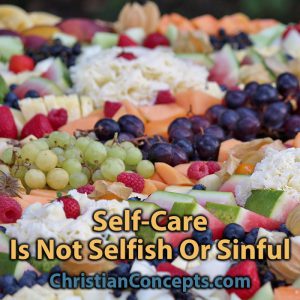Reading time: 4 minutes
Christians are not supposed to be selfish so they often end up at the other extreme: being self-neglectful. But being selfless doesn’t prevent self-care. You can be content while caring for yourself and others.
Selfishness at its root is wastefulness. Poor stewardship is the misuse of resources. Gluttony is a perfect example of selfishness. People are selfish when they consume more than they need while others don’t get what they need.
The selfish person refuses to do what is helpful and right. He prioritizes his wants over another person’s needs. Selfishness overlaps with pride. A selfish person might throw away good food instead of giving it to those in need. This person is deliberately spiteful or intent on seeing others suffer.
With such a bleak definition, you might think, “I’m not that selfish.” And maybe you’re right. Instead, maybe you are self-neglectful. Would you starve yourself so another can eat? That is just as extreme as letting others starve.
It’s Nearly Impossible to be Content and Selfish
The selfish person can’t be thankful. Being thankful allows you to see the abundance of what you have. Take a moment to consider the excess you have. Most people have well beyond what they need to be happy. Yet, many people aren’t happy. What will it take for you to be happy?
Selfishness can also have a fearful root. I should think only of myself in case something bad happens. True contentment is living with peace in any circumstance. To be selfish is a negative grab for satisfaction. Paul wrote about contentment:
I am not saying this because I am in need, for I have learned to be content whatever the circumstances. I know what it is to be in need, and I know what it is to have plenty. I have learned the secret of being content in any and every situation, whether well fed or hungry, whether living in plenty or in want. I can do all this through him who gives me strength.
Philippians 4:11-13 NIV
Contentment is an internal state. You can prefer blue skies over grey skies, but still be content on a cloudy day. Selfishness exists because of discontentment with circumstances. The secret to contentment is knowing what happens when your life ends. Nothing provides greater peace than knowing God has chosen you to be with Him in paradise (Luke 23:43).
It’s Possible to Pursue Self-Care and be Selfless
Because of sin, it’s easy to be selfish. It’s also easy to give others what they want to avoid any uncomfortable conflict (also know as people pleasing). But you can be generous and have healthy boundaries at the same time. You can because self-care isn’t selfish. With God’s help, your motives for giving can be free of resentment, bitterness, or anything negative.
God wants you to be selfless. That means you work toward being a good steward of the resources God has given you. You know the difference between what you need and what you want. You derive your happiness from the abundance of what you already have. You share what you have with those who have need. You give to others only when your giving helps instead of creating further harm. Paul explains how to have the right motivation to give:
So I have decided to ask Titus and the others to spend some time with you before I arrive. This way they can arrange to collect the money you have promised. Then you will have the chance to give because you want to, and not because you feel forced to. Remember this saying, “A few seeds make a small harvest, but a lot of seeds make a big harvest.” Each of you must make up your own mind about how much to give. But don’t feel sorry that you must give and don’t feel that you are forced to give. God loves people who love to give.
2 Corinthians 9:5-7 CEV
When you are focused on God and His kingdom, you can be happy and content whether you are in need or have plenty. You can allow yourself to enjoy the life God has given you.
Learn more about struggling with circumstances.
Image by Ulrike Mai from Pixabay





